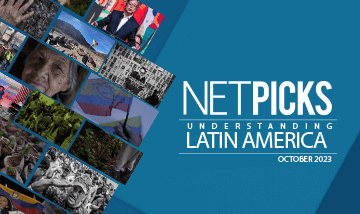Índice
- PARAGUAY
- CATASTROPHIC FLOODING AND STATE NEGLIGENCE IN PARAGUAY LEAVE THE POORESTVULNERABLE
- BRAZIL: OUTSOURCING REPRESSION
- BRAZIL: OUTSOURCING REPRESSION
- ECUADOR’S CRACKDOWN ON ABORTION IS PUTTING WOMEN IN JAIL
- ECUADOR’S CRACKDOWN ON ABORTION IS PUTTING WOMEN IN JAIL
- THE ROOTS OF THE NATIONAL STRIKE IN HONDURASEDA
- THE ROOTS OF THE NATIONAL STRIKE IN HONDURAS: AN INTERVIEW WITH BAYRON RODRÍGUEZ PINEDA
- A VICTORY FOR GUATEMALA’S PACTO DE CORRUPTOS
- A VICTORY FOR GUATEMALA’S PACTO DE CORRUPTOS
NETPICKS: UNDERSTANDING LATIN AMERICA
Selected food for thought about Latin America. Every month we trawl the web for in-depth analysis, research summaries and opinions we think particularly worth reading, and that you won’t find in the mainstream media.
This month we bring you five articles from Paraguay, Ecuador, Brazil, Guatemala and Honduras, with themes ranging from the criminalization of women who abort in Ecuador, the dire situation of the poor in flood prone areas of Asunción, the capital of Paraguay, the increasingly violentparamilitary type atmosphere created by Jair Bolsonaro in Brazil, to the electoral battles in Guatemala and the street protests in Honduras.
PARAGUAY
CATASTROPHIC FLOODING AND STATE NEGLIGENCE IN PARAGUAY LEAVE THE POOREST
VULNERABLE
As in most places it’s the poor that suffer most from not always so ‘natural’ ‘disasters’. Paraguay is no exception to the rule. Climate change and deforestation in the north of the country have altered the levels of the Paraguay River which runs for a 1,000 km through the country, feeding the globally important Parana wetlands and subsequently emptying into the Rio de la Plata. Many communities along the river, including in the capital Asunción, had become used to periodic flooding, but now the floods are more frequent and severe, leading to major displacement and the appearance of ‘temporary’ shelters in public spaces in the Capital, but State help has not been forthcoming. The government’s proposal for a long term solution to the problem has also made many of the inhabitants of flood prone zones suspicious, fearing that they will be permanently displaced as the real motive behind the plan is economic and not concern for their welfare.
https://www.opendemocracy.net/en/democraciaabierta/catastrophic-flooding-and-state-negligence- paraguay-leave-poorest-vulnerable/ William Costa, Open Democracy, 07 June 2019
BRAZIL: OUTSOURCING REPRESSION
BRAZIL: OUTSOURCING REPRESSION
Paramilitary violence was used extensively in Colombia to not only fight a dirty war against the major country’s guerrilla forces, but also to silence opposing voices and close off spaces for any democratic expression of progressive politics. Jair Bolsonaro’s Brazil now appears to be heading in the same direction. The Bolsonaro family seems to have links to organized crime militias and, perhaps more importantly, there is clear ideological affinity between them and Bolsonaro. These militias wield enormous power in Brazil, in particular in Rio de Janeiro where they are big political contributors, and that target left wing organizations under the guise of protecting favelas. At the same time, the President has made no secret of his desire to cleanse Brazil of ‘leftist criminals’. As the Bolsonaro regime lacks a major popular movement, rather than leading to a fascist dictatorship as some have suggested, the main threat of the present government appears to be the creation of a permissive climate in which right wing militias and police impunity are considered the answers to rather than the causes of violence. The problem for the left and others who get in the way of criminal activity is that they will be considered at once politically illegitimate and legitimate targets of violence.
https://nacla.org/news/2019/06/05/outsourcing-repression Benjamin Fogel and Matthew Aaron Richmond, NACLA, June 5, 2019
ECUADOR’S CRACKDOWN ON ABORTION IS PUTTING WOMEN IN JAIL
ECUADOR’S CRACKDOWN ON ABORTION IS PUTTING WOMEN IN JAIL
Abortion has always been fervently opposed by the Catholic Church and conservative sectors of Ecuadorian society; however, in practice, many women did abort: more than 430 thousand abortions being registered between 2004 and 2010. As a result the environment appeared to be changing in the first decade of the present century, with many expecting the approval of more tolerant legislation. But after the 2011 National Assembly debate in which then President Rafael Correa, an ardent Catholic, dramatically intervened, things got worse instead of better. Doctors began actively working with the police to denounce cases, or suspected cases, of ‘illegal’ abortions. Many women have consequently been detained, even when the evidence is scant, and some have ended up in jail; since 2015 prosecutors have investigated at least 378 cases. In a country with one of the highest rates of juvenile pregnancy in Latin America – 12 percent of girls 10 to 19 having been pregnant at least once – and where 700 girls under ten reported being raped in the past three years, the situation is evidently dire, and the necessity for reform clearly urgent. https://www.thenation.com/article/ecuador-abortion-miscarriage-prosecution/ Zoe Carpenter . The Nation, May 07 2019
THE ROOTS OF THE NATIONAL STRIKE IN HONDURASEDA
THE ROOTS OF THE NATIONAL STRIKE IN HONDURAS: AN INTERVIEW WITH BAYRON RODRÍGUEZ PINEDA
The IMF advised restructuring of health and education in Honduras has provoked a major public response. Despite often brutal repression, a long lasting strike has brought about concessions from the government, whose plans to ‘decentralize’ education implies lower salaries (lower than new police recruits) and temporary contracts, renewable every three months. The teachers unions have always been strong, and represent the backbone of the organizing, but the strikes have broadened to include sectors other than the doctors and teachers, and participation has led to greater awareness in the general population but the fight is still not over, the local movements are nascent and their ability to survive further repression is in question. https://nacla.org/news/2019/06/10/roots-national-strike-honduras-interview-bayron-rodr%C3%ADguez-pineda Beth Geglia, NACLA, June 10, 2019
A VICTORY FOR GUATEMALA’S PACTO DE CORRUPTOS
A VICTORY FOR GUATEMALA’S PACTO DE CORRUPTOS
The two leading candidates from the recent Guatemalan presidential elections will have the chance to consolidate their presence in the run off, scheduled for this coming August. Sandra Torres, the more progressive of the two candidates, polled 25% of the vote, ten points ahead of her main rival, four times candidate Alejandro Giammattei, who has been linked to organized crime and has promised to bring back the death penalty. Her advantage may not be enough however. Torres, the ex-wife of ex-President Alvaro Colom, presently under house arrest accused of fraud during his time as President, also has a disapproval rating of 50%. What unites the two candidates is their opposition to the UN supported International Commission against Impunity (CICIG), which has investigated both. Major demonstrations in the country in 2015 brought hope for a major political transformation, but while some changes have been made, and the indigenous candidate, Thelma Cabrera, did poll 10 of the vote in the first round, the political scenario is still dominated by right wing forces determined to maintain the Status Quo. https://nacla.org/news/2019/06/21/victory-guatemalas-pacto-de-corruptos Rachel A. Schwartz NACLA, June 21, 2019





